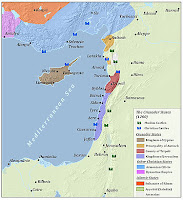 |
| Saladin |
Richard and Saladin showed great mutual respect for each other's military prowess. A temporary halt to hostilities was declared so they could come to terms. At one point, when Richard became ill, Saladin sent him fruit that was chilled with snow brought from the mountains, and offered his personal physician. Also, Saladin sent two horses as replacements for Richard's.
An attempt was made to join East and West by the marriage of Richard's sister, Joan (1165-1199), to Saladin's brother, Al-Adil (1145-1218), who was currently administrator of Egypt. Joan had been married to King William II of Sicily, but he had died in 1189; later she would become Countess of Toulouse by her marriage to Raymond VI. The plan was for Jerusalem to be their wedding gift, and would therefore pass into the hands of a dynasty that joined Western Europe (or, at least, England!) to the Muslim world. Negotiations fell through, however.
The two commanders did agree on a three-year truce. In summer 1192, the Treaty of Ramla determined that Jerusalem would remain under Muslim control, but Christians would be allowed safe passage. Also, the Crusaders would give up lands they had invaded except for a narrow coastal strip that extended from Tyre to Jaffa. Neither leader was wholly pleased, but each had reason to wish a swift end to the conflict. Richard had troubles at home due to his brother John. Saladin was losing control of his army because of his failure to re-take Acre or to route Richard's forces in their many engagements.
 Saladin died of yellow fever in 1193. While his heirs fought over the succession, Western Europe was told tales of Saladin's military prowess and chivalrous actions toward the invaders. There is an anecdote that, in April 1191, a Frankish woman on pilgrimage
had her baby stolen and sold into slavery. According to Saladin's
biographer, Saladin bought the baby
back with his own money and returned it to the mother, then ordered a horse to take her back to her camp. Poems were written in praise of him. Richard declared him the greatest leader in the Islamic world.
Saladin died of yellow fever in 1193. While his heirs fought over the succession, Western Europe was told tales of Saladin's military prowess and chivalrous actions toward the invaders. There is an anecdote that, in April 1191, a Frankish woman on pilgrimage
had her baby stolen and sold into slavery. According to Saladin's
biographer, Saladin bought the baby
back with his own money and returned it to the mother, then ordered a horse to take her back to her camp. Poems were written in praise of him. Richard declared him the greatest leader in the Islamic world.And the punchline? All the negotiations and gifts between Richard and Saladin were made by proxies. The two men who so praised and respected each other never met face-to-face.
No comments:
Post a Comment
Note: Only a member of this blog may post a comment.